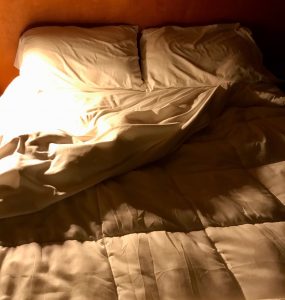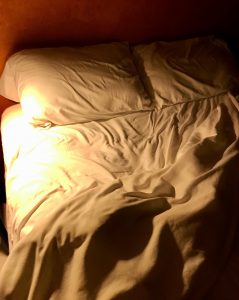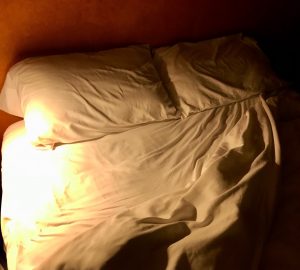If I were a scientist, I’d choose to be a sleep researcher. Sleep intrigues me. It mystifies me. Why do we need it? What happens inside our bodies and brains when we get it? Why is it so difficult for some people to achieve enough of it? What can we do about it?
Obviously, this thing called sleep, which Shakespeare labeled “Nature’s soft nurse,” serves an essential biological function; and the fact that it exists in almost all animal species is, to me, a clear indication that what we commonly refer to as “a good night’s sleep” is fundamental to our overall well-being.
According to the Sleep Foundation (www.sleepfoundation.org), “In humans, sleep appears to be critical to both physical and mental development in babies, children, and young adults. In adults, a lack of sleep has been associated with a wide range of negative health consequences, including cardiovascular problems, a weakened immune system, higher risk of obesity and type II diabetes, impaired thinking and memory, and mental health problems like depression and anxiety.
“These diverse ramifications of sleep deprivation offer strong support to the view that sleep doesn’t have just one biological purpose but in fact, through its complexity, is an important contributor to the proper functioning of nearly all of the systems of the body,” the foundation says.
It does not come as news to learn that good sleep – along with a healthy diet and exercise — is one of the pillars of good health. Nevertheless, too few people appear to achieve it. According to the CDC (U.S. Centers for Disease Control and Prevention), more than one-third of adults in the U.S. routinely sleep fewer than six hours a night. And that’s bad news because the benefits of adequate sleep range from better heart health and less stress to improved memory and weight loss.
There’s another important and timely connection between sleep and health, I just learned. In his article, “The Mysterious Link Between COVID-19 and Sleep” in the Atlantic (https://www.theatlantic.com/health/archive/2020/12/covid-19-sleep-pandemic-zzzz/617454/), James Hamblin, MD, claims that sleep could even be a key to ending the pandemic.
“The only health advice more banal than being told to wash your hands is being told to sleep more,” Hamblin writes. “But it’s a cliché for a reason. Sleep fortifies and prepares us for any given crisis, but especially when the days are short and cold, and people have little else they might do to empower and protect themselves. … It may well turn out that standard pandemic advice should be to wear a mask, keep distances, and get sleep.”
That’s easier said than done, he admits. Quoting again from the Atlantic article: “Right now we’re seeing people losing interest in things, isolating, not exercising, and then not getting sleep. Depression and anxiety make insomnia worse, and the cycle degenerates.”
A key to healthy pandemic sleep, this article points out, is to deliberately build daily and bedtime routines. Take scheduled walks. Get sunlight early in the day. Reduce blue light before bed. And stay connected with other people in meaningful ways, despite being physically distant.
But if you find, as I often do, that after the light on your bedside table has been turned off and you’re lying there in your clean, comfy bed in the dark, wide awake, thinking too much, and wishing-hoping-praying you could simply float up to dreamland in the blink of a closed eye, you might want to play a little game I devised a few years ago.
This game does two things at once: It forces you to do relaxing deep-breathing exercises and it diverts your mind away from your worries. The game goes like this (and I’ve found it always works):
Lying on your back, place your hands flat against your abdomen. Then think of words that begin with the letters “in-.” Allow these words to pop into your mind at random. As you think of each one, breathe IN on the “in” syllable, then breathe OUT on the remainder of the word.
For example: “IN-[inhale] credible [exhale]… IN-[inhale] appropriate [exhale]… IN-[inhale] spirational [exhale]… IN-[inhale] vestment [exhale]… IN-[inhale] struction [exhale]… IN-[inhale] heritance [exhale]… IN-[inhale] justice [exhale]… IN-[inhale] conceivable [exhale]… IN-[inhale] digestion [exhale]… And so on, and so on.
With every deep inhale, you should feel your hands rise as your abdomen rises; with each exhale, they lower. By the time you’ve thought of about a dozen “in-” words and taken as many long, slow, deep breaths, you’ll be sound asleep.
No, I’m not a scientist, nor a doctor, nor a sleep therapist, just a person who, in addition to wishing everyone a happy, healthy new year on this New Year’s Day, wish us all many better nights of sleep in 2021.
~ ~ ~ ~ ~ ~
To recap…
10 Reasons Why Good Sleep Is Important
(Summarized from an article by Joe Leech, MS, in Healthline, February 24, 2020:)
1) Short sleep duration is associated with an increased risk of weight gain and obesity in both children and adults.
2) Poor sleep affects hormones that regulate appetite. Those who get adequate sleep tend to eat fewer calories than those who don’t.
3) Good sleep can maximize problem-solving skills and enhance memory. Poor sleep has been shown to impair brain function.
4) Longer sleep has been shown to improve many aspects of athletic and physical performance.
5) Sleeping less than 7–8 hours per night is linked to an increased risk of heart disease and stroke.
6) Sleep deprivation can cause pre-diabetes in healthy adults in as little as 6 days. Many studies show a strong link between short sleep duration and type 2 diabetes.
7) Poor sleeping patterns are strongly linked to depression, particularly for those with a sleeping disorder.
8) Getting at least 8 hours of sleep can improve your immune function and help fight the common cold.
9) Sleep affects your body’s inflammatory responses. Poor sleep is linked to inflammatory bowel diseases and can increase your risk of disease recurrence.
10) Sleep deprivation may reduce your social skills and ability to recognize people’s emotional expressions.




I do this. I take a deep breath to the count of 4, the hold it for a count of 7, then blow it out to the count of 8. I repeat until I am fast asleep. Works for me most of the time.
Wonderful, Alice! Thanks so much for sharing your technique. Happy New Year!
So true, Bonnie querida! That’s why the expression “beauty sleep” I guess 🙂 I try to get mine every night. Eight hours at least, ten if possible. Besitos y feliz año nuevo!
And all this time I thought you wrote your books all night, Te! 🙂 So glad to know you manage to get a good night’s sleep every night AND write so many books. Si, feliz ano nuevo a ti tambien. — xx
Happy New a Year, dear friend! I’ll have to try your INstructive advice. I have no trouble falling asleep. It’s 4:30 in the morning that is my nemesis. Sleep is magical and restorative. INhalar, exhalar, repeat!
Yes, Suz, my little “game” works equally well for falling back to sleep. And when we run out of in-words in English, we can always switch to Spanish! (IN-surgentes…) Feliz ano to you, too, querida.